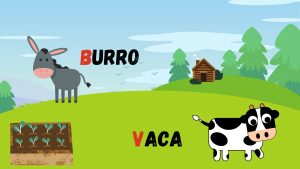3.8 The Sound of the Cow and the Donkey: V = B

Learning Objectives
In this chapter you will:
- Review the fact that Spanish “b” and “v” are identical.
- Compare the English and Spanish “v.”
- Practice pronouncing these two letters in exactly the same way.
A cow and a donkey share many common features: they are mammals, four-legged, and hervibore animals. In Spanish, they share an additional feature: their names start with exactly the same sound. Although the Latin “b” and “v” were pronounced differently, as stated in chapter 3.2, in Spanish the sound of the “v” is identical to the “b”: they are both voiced bilabial sounds. In English, the “b” is bilabial, but the “v” is labiodental. That is why, it is often a challenge for en English speaker to pronounce the “v” correctly in Spanish. It is for this reason that we dedicate a whole chapter to this issue.
Before we practice, remember that the letters “b” and “v” represent the sound /b/ and also its variant [β]. Please see chapter 3.2 to review.
In the next table, we show a list of words spelled with a “b” in the right column and their counterparts spelled with a “v.” Remember that the pronunciation is identical. Although the meaning is different, your interlocutor will know what you mean from the context. Please listen and repeat after the speaker.
| B | V |
| basta (enough) | vasta (vast) |
| bello (beautiful) | vello (hair) |
| rebelar (to rebel) | revelar (to reveal) |
| cabe (from “caber,” to fit) | cave (from “cavar,” to dig) |
| hierba (herb) | hierva (from “hervir,” to boil) |
| bienes (assets) | vienes (from “venir,” to come) |
| cabo (cape) | cavo (from “cavar,” to dig) |
| tubo (tube) | tuvo (from “tener,” to have) |
| botar (to throw) | votar (to vote) |
| grabar (to record) | gravar (to tax) |
| bacilo (bacillus) | vacilo (from “vacilar,” to hesitate) |
Self Analysis Activity

• La revista reveló que, en cautiverio, el terrorista se rebeló e hirió a una vasta cantidad de personas que gritaban, “basta”.
• El señor Baca tiene una vaca en su haber; a ver cuánto le dura.
• Unas bayas de la planta se derramaban por encima de las vallas, pero no vayas por ahí, pues es peligroso.
• Yo nunca cavo en el cabo porque protejo mis bienes y además porque tú nunca vienes.
• El tubo tuvo un problema que Beto no pudo resolver.
Listen to your recording and answer the following questions. Answers will auto-save every 10 seconds.

